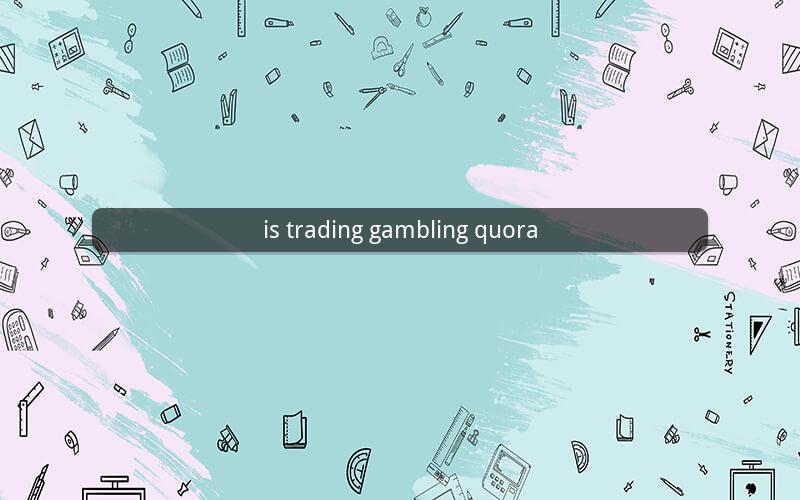
Table of Contents
1. Introduction
2. Understanding Trading
3. Understanding Gambling
4. The Differences Between Trading and Gambling
5. Risks and Rewards in Trading
6. Risks and Rewards in Gambling
7. The Psychological Aspect
8. The Legal Aspect
9. Conclusion
1. Introduction
Trading and gambling have always been topics of debate and intrigue. While they might seem similar at first glance, they are fundamentally different in their nature, purpose, and outcomes. This article aims to delve into the similarities and differences between trading and gambling, focusing on the aspects that make them distinct from each other.
2. Understanding Trading
Trading involves buying and selling financial instruments such as stocks, bonds, currencies, and commodities. The primary objective of trading is to make a profit by capitalizing on price movements in the market. Traders use various strategies, tools, and analysis techniques to predict market trends and make informed decisions.
3. Understanding Gambling
Gambling, on the other hand, is a form of entertainment where individuals place bets on the outcome of a random event. The main goal is to win money, but there is no guarantee of success. Gambling can be done in various forms, including casino games, sports betting, horse racing, and lottery.
4. The Differences Between Trading and Gambling
The primary difference between trading and gambling lies in the nature of the activity. Trading is a skill-based endeavor that requires knowledge, analysis, and discipline. In contrast, gambling is based on chance and luck.
4.1 Skill vs. Luck
Trading involves the application of knowledge, experience, and analysis. Traders need to understand market dynamics, financial instruments, and risk management to succeed. Gambling, on the other hand, relies on chance and luck, with no guarantee of a return on investment.
4.2 Risk Management
Traders use risk management techniques to minimize potential losses. They set stop-loss orders, diversify their portfolios, and employ hedging strategies. Gamblers, however, often take on higher risks, as they are driven by the thrill of winning big.
4.3 Long-Term vs. Short-Term Goals
Trading is typically a long-term endeavor, with traders aiming to generate consistent profits over time. Gamblers, on the other hand, often seek short-term gains and may quit once they achieve their objectives.
5. Risks and Rewards in Trading
Trading carries both risks and rewards, with the potential for substantial profits if done correctly. Here are some key aspects:
5.1 Risks
Market volatility, lack of discipline, and poor risk management are some of the risks associated with trading.
5.2 Rewards
Successful traders can earn significant profits through various strategies, including day trading, swing trading, and long-term investments.
6. Risks and Rewards in Gambling
Gambling also carries risks and rewards, but with a different nature:
6.1 Risks
Addiction, financial loss, and emotional distress are some of the risks associated with gambling.
6.2 Rewards
The thrill of winning and the potential for a windfall are the rewards of gambling.
7. The Psychological Aspect
The psychological aspect plays a significant role in both trading and gambling. Traders need to maintain discipline, remain calm under pressure, and avoid emotional decision-making. Gamblers, on the other hand, may experience excitement, anxiety, and disappointment based on the outcome of their bets.
8. The Legal Aspect
The legal aspect of trading and gambling varies by country and region. While trading is generally legal, certain activities may be restricted or prohibited. Gambling, on the other hand, is illegal in some places, while others have specific regulations and licensing requirements.
9. Conclusion
In conclusion, trading and gambling share some similarities, such as the potential for profit and loss. However, they differ significantly in their nature, purpose, and outcomes. Trading is a skill-based endeavor with long-term goals, while gambling is based on chance and short-term gains. Understanding these differences is crucial for anyone considering engaging in either activity.
Questions and Answers:
1. Q: Is trading always riskier than gambling?
A: Not necessarily. Both activities carry risks, but the level of risk depends on the individual's approach, knowledge, and strategy.
2. Q: Can someone make a living through trading?
A: Yes, it is possible for individuals to make a living through trading if they possess the necessary skills, knowledge, and discipline.
3. Q: Is gambling always a waste of time?
A: No, gambling can be a form of entertainment, but it is important to approach it responsibly and set limits.
4. Q: Can a trader turn a losing streak into a winning streak?
A: While it is possible, it requires skill, knowledge, and the ability to adapt to changing market conditions.
5. Q: Are there any similarities between trading and gambling?
A: Both activities involve risk, the potential for profit, and the element of chance.
6. Q: Can someone be addicted to trading?
A: Yes, just like gambling, trading can be addictive if the individual becomes obsessed with making money.
7. Q: Are there any benefits to gambling?
A: Gamblers can enjoy the excitement of the game and, in some cases, develop strategic thinking skills.
8. Q: Can a trader become a successful gambler?
A: It is possible, but the skills required for trading and gambling are different, and success in one does not guarantee success in the other.
9. Q: Is it legal to trade in my country?
A: The legality of trading varies by country, so it is essential to research the specific regulations in your jurisdiction.
10. Q: Can I make money by trading or gambling without any experience?
A: It is possible, but the chances of success are significantly lower for individuals without the necessary knowledge and skills.